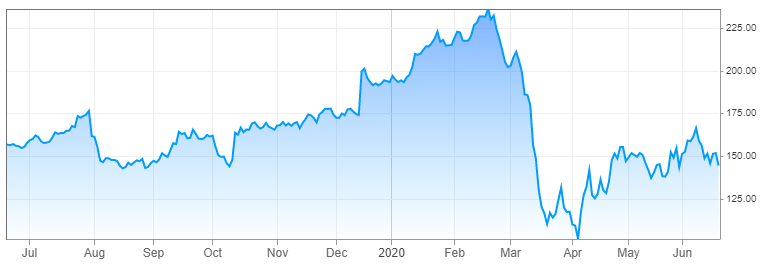Taylor Wimpey Shares Fall by 5% After Share Placing Raised £522 Million

As the trading began on London stock exchange on Monday, the shares of Taylor Wimpey PLC have fallen by 5%. The stock previously closed at 151.8p and after recent losses retreated to 144p.
The main reason behind this move was the fact that the company has placed a retail share offer at 145p a share. This represented a 5% discounted compared to the closing price of the previous day’s trading session. The total amount raised during this process reached £522 Million.
So the obvious question here is: why did the company decide to raise additional capital? Well, according to the Proactive Investor, the firm’s representatives stated that the outbreak of COVID-19 has significantly disrupted the land market.
It is a well-known fact that real estate is not really a very liquid market. This is especially true when it comes to land pots. As the coronavirus spread and lockdowns imposed across the world, panic selling started to dominate the markets. This led to a stock market crash in March, where some stocks even lost more than half of their market value in less than a 4 week period.
This trend also affected the prices of land pots. The basic law of supply and demand applies to the real estate market as well. As many owners tried to liquidate their landholdings, this led to increasing supply and consequently, to declining prices. Face with this situation, the Taylor Wimpey management recognized a unique opportunity to buy those plots of land at undervalued prices and potentially increase their profit margins in the process.
Three Options for Raising Capital
Now, when companies want to raise a large amount of capital they have essentially three options. Firstly, management can apply for additional bank loans. This approach might work under several scenarios, however in this case this might not be a good idea.
It goes without saying that buying land plots at cheap prices can eventually lead to company higher profits. However, this will only happen after the firm completes the construction of homes and sells them to clients for profits, or rents them to tenants. This process can easily take one year or even more.
However, in the case of a loan, the bank will expect interest payments from the next month. This means that the company has to spend millions of pounds on debt repayments and interest expenses for many months before the firm can receive any income from selling or renting those newly built properties.
The second option is to borrow money from investors. This can be accomplished by issuing corporate bonds. Here the company does not have to pay monthly interest to lenders. Instead, many firms make coupon payments twice per year. Despite some of its advantages, it has its drawbacks as well. Firstly, the interest rates on corporate bonds are in many cases, higher than with bank loans. Also, most likely the company still has to make at least 2 coupon payments before it’s new homes could bring in any significant amount of revenue. So this was not the best option either.
The third option is for the company to issue additional shares, exactly as the current management has decided to proceed. The main benefit of this approach is the fact that the company is under no legal obligation to issue monthly or semi-annual payments to shareholders. If those projects succeed then the owners of those shares might benefit from increasing dividends and possibly even from the rising share price. On the other hand, if those newly built properties do not bring in the expected profits, then the company does have to repay any loans or maturing bonds.
So as we can see from the above, considering the company circumstances, the third approach had certain advantages over the other 2 options. However, this is not to say that it had no downsides. Returning to the basic economic law of supply and demand, when the company for whatever reason increases the actual number of shares in circulation, the value of each share decreases. It is essentially the opposite of stock buybacks. So in this instance, the interest of shareholders has been compromised.
The very fact that the company canceled its dividends is not a great piece of news for investors either. So it is likely that unless the company compensates its shareholders by higher payouts or stock buybacks, market participants might conclude that the management is not really committed to building shareholder value. This in turn can have very damaging effects on the future stock price performance of the company. On the positive side, the management did announce its intention to resume dividend payments from 2021.
Current Share Price Performance

source: cnbc.com
As we can see from the above chart, after the initial decline in July 2019, the stock price has made some steady gains for the next 7 months, rising from 157p to eventually reach an all-time high of 232p.
After this development, the shares fell victim to the March 2020 stock market crash. As a result of this process, the stock collapsed and dropped all the way down to 102p. This decline was followed by moderate recovery when the stock stabilized around 144p. So despite the recent appreciation, the price remains even at lower levels than during the previous summer.
The current Earnings per Share (EPS) indicator of the company stands at 20.61p. This means that the Price to Earnings (P/E) ratio at current prices stands at 6.99. This suggests that the stock might be significantly undervalued.
The beta indicator of the stock is at 1.91, so essentially it is nearly twice as volatile than the FTSE 100 index. Consequently, this Taylor Wimpey shares might not be the best investment option for those investors who worried about the potential loss of a large portion of investment due to stock market fluctuations.
On balance, we might conclude that at recent prices the stock does have a significant upside potential due to its current undervaluation. However, Taylor Wimpey shares are not currently the best options for income investors and for those market participants who are concerned about capital preservation.


























Comments (0 comment(s))